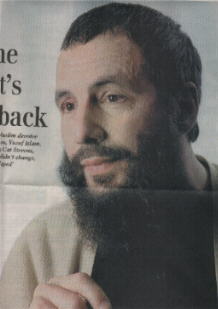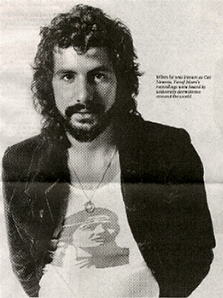A May 22, 2000 review from
the Toronto Globe newspaper. This article comes courtesy of Gloria Mills.
The Cat's Comeback
From rock star to
Muslim devotee to a melding of the two, Yusuf Islam formerly known as cat Stevens, assures
his fans: " I didn't change, I just developed ."

- Globe and Mail, "Globe
Review",
- May 22nd, 2000
- written by Stephanie Nolen,
- Globe and Mail, Toronto.
He calls it, in the
munificent and slightly pious tones for which he has been known these past years, "a
gift to have been able to see life from so many perspectives".
Others have been less kind,
talking of his rapid and radical metamorphoses. There was Cat Stevens, singer of sweet,
simple songs and superstar, in the 1960's and 1970's. then there was the sudden change to
Yusuf Islam, a Muslim devoted both to his new faith and to some of its more extreme
politics.
And now we have a new
incarnation, something of a fusion, as if the inner rock star has bubbled to the surface
again in the slight, bearded Muslim body.
Thirty years after his
first big success in North America, Universal Music has rereleased his albums, including a
new compilation called "The Very Best Of Cat Stevens".
And at 52, Islam is working
a little music promotion into his full-time job as a Muslim educator and campaigner. He's
been back in the recording studio, although his new work is introductions to Islam
undiluted by his acoustic guitar. He is putting out new tendrils of public personae.
Cat Stevens had his first
big hit at 19, and had sold 40 million records a decade later. But shortly after his 1977
conversion, he distanced himself sharply from his music, publicly auctioning off his
guitars (giving the proceeds to a Muslim charity) announcing that he would not sing again.
He embraced his new
religion with a zeal common in converts, and signed on to many of its political trappings.
In the 1980's, he supported the death sentence issued against author Salman Rushdie;
during the Persian Gulf war he spoke sympathetically of his "Muslim brother",
Iraqi President Saddam Hussein. Most recently, he joined a campaign in Britain to maintain
a ban on homosexuality in schools. (It's unclear whether he still supports these stands,
because the topics were put strictly off limits, at his request, by a Universal publicist,
who tightly monitored an interview on Saturday).
But it is apparent
that his hard line on music has softened.
First, he has realized that
the theological stricture on music is not what he first thought upon his conversion.
"This issue of music
in Islam is not as cut and dried as I was led to believe," he said. "I relied on
heresy, that was perhaps my mistake." His first Islamic teachers taught that music
"represents frivolity and time-wasting", but he has since come to understand
that it can serve a purpose. It was the music of Bosnian Muslims, which he first heard
during the war in Yugoslavia, the music of the people who had lost everything else, which
first helped him to understand this.
Then, listening to the
music he wrote as Cat Stevens - Moonshadow, Peace Train, Morning Has
Broken - he saw a prescient hint of his later spiritual discoveries. "A lot of my
songs reflected something much more than frivolous".
That helped. Then there is
the fact that, 22 years after embracing Islam, he no longer feels he has something to
prove.
"I had to go through a
phase of transformation," he said of his initial hard line. And having mellowed, if
we may use the word about a "sixties" icon, he can try to speak to the people
alienated by his zealous conversion. "I can reconnect with the people I felt I
abandoned, which I regret more than anything".
And when you spend a little
time around the one-time Cat, you begin to wonder, whether, perhaps he has allowed this
rerelease of the music because the inner rock star had been chafing in obscurity too long.
Islam retains a certain
flair for prima donna behaviour. He ferociously controls his image, although he suggests
that this concern is motivated by the media's habit of misrepresenting Islam. At our
meeting, he rejected the camera initially selected by the Globe photographer, saying he
didn't like the lens. When the photographer offered to use another one, Islam closely
inspected a Polaroid version of the images to come, then advised the photographer to stand
further back. He then posed for about 90 seconds.
He scrupulously
tape-recorded our conversation, then was distressed to discover that his tape had run out
midway through. I offered to send a copy of mine; he called the publicist ten times after
the interview to reiterate that he wanted the tape. He expressed concern about the
questions I asked, the creeping of politics into our conversation, quizzed her on what she
thought I should write.
In the years after his
conversion, Islam did interviews (always on Muslim issues such as the war in Afghanistan)
in a flowing white robe and white knitted prayer cap. Today, his sartorial hard line was
softened, too. On Saturday he wore simple navy trousers and a ribbed cotton shirt with a
beige cardigan. His hair was short and a little raggedy, but his black beard was full.
There was a hint of rock star in his ankle-high leather boots.
He speaks with passion and
an undimmed verve about his religion; his recollection of his first cautious foray into
the Koran is a little jarring, as he tells the story in a jovial West London accent. He
was in Toronto this weekend to speak at a conference of the Islamic Society of North
America. In the same way that he spent years trying to explain Islam to a bemused, often
hostile, world of Western fans, he now feels a certain obligation to explain the
resurrection of Cat Stevens to the Muslim community.
It makes for a lot of
diplomacy.
 "If you are
attacked from the front and the rear, you are wise to keep your eyes open," he said
with a charming grin. "If you are
attacked from the front and the rear, you are wise to keep your eyes open," he said
with a charming grin.
Islam began to record again
five years ago with spoken-word albums on his faith (The Life of the Last Prophet
and Prayers of the Last Prophet) and a fund-raising album for victims of the war in
Bosnia (I Have No Cannons That Roar). He has just produced a book called A Is
For Allah, designed to introduce children to the religion. He began the project when
the first of his five children were born in 1980, and he discovered that there were few
materials to teach her about her religion.
"Some Muslims can't
explain the faith," he said. "You have to begin very carefully, with a message
of unity". Thus the book, richly illustrated, with a small if slightly stern text for
each of the letters of the Arabic alphabet. (And the occasional poke at foolish
non-believers, who would believe scientists who told them a meteor was headed for earth,
"yet when the Koran tells them about Paradise and the punishment of the blazing fire,
they turn away in disbelief....")
It was, Islam says, the
idea of unity which first spoke to him when he picked up the Koran - a birthday gift from
his brother, who knew of his search for faith.
"Unity, brotherhood,
morals, the day of judgement," he recalls. "And balance."
Those ideas rang true. They
shared a foundation with what he learned at Catholic school, as the child Stephen
Georgiou. But Islam moved past the problems he had had with ideas such as the Trinity in
Christianity. He sensed, immediately, that it was a book revealed by God; and an
evolution.
"This is not anything
more than the progress of religion to perfection," he explained. "Religion
always felt unfinished - it was because you've missed the last Prophet".
Islam grew up in London;
his parents, a Swedish woman and her Greek Cypriot husband, owned a restaurant. Islam was
raised with a "great dread" of Islam, the religion of the Greek Cypriots'
enemies: the Turks.
When he first picked up the
Koran (inspired, so the story goes, by a battle with tuberculosis, and then a
near-drowning in the sea near Malibu), it was another step in a spiritual search that took
him through Buddhism, Hinduism, Tarot cards and astrology. Knowing little of Islam, he
made "a conscious decision to read without bias". He had feared that he would
never find a religion that gave him all the things he sought, but the answers were there.
His conversion, to the initial consternation of friends and family and bewilderment of
fans, was quick.
Today, he supervises four
Islamic schools in London; he believes children need an education that includes the
spiritual, instead of a quick nod in comparative-religion class to "those people who
pray on towels".
The Prince of Wales visited
one of the schools last week, Islam said, and told the students they are "ambassadors
of a much-misunderstood religion", which Islam sees as one sign of a growing
understanding of Muslims. Still, he lobbies the British government to fund the schools in
the same way they do Jewish and Catholic ones.
Half of the proceeds from
the rerelease of the albums will go into Islam's charitable pursuits.
He is no longer affiliated
with Muslim Aid, which he helped to found during the famine in the Horn of Africa in the
mid-1980's, but now has a foundation called Small Kindness, which works with children in
the Balkans, and more recently, flood-devastated Mozambique. He is motivated by the
Islamic commandment to tithe to charity, and by the ban on usury, which means that his
income cannot be left to accumulate interest. Instead of bank accounts, he puts record
royalties into a "Muslim-friendly" hotel in London, which in turn generates
funds for the schools.
Songs such as Hard
Headed Woman and How Can I Tell You never went out of radio rotation, but the
rerelease has them back on lots of CD players. Islam has them on his own from time to
time: "I was wanting to remember what I wrote." Plus, he says, the last albums
are "underrated".
Now he can get about that
business of reconnecting with fans - he wants them to understand that, "I didn't
change, I just developed". |